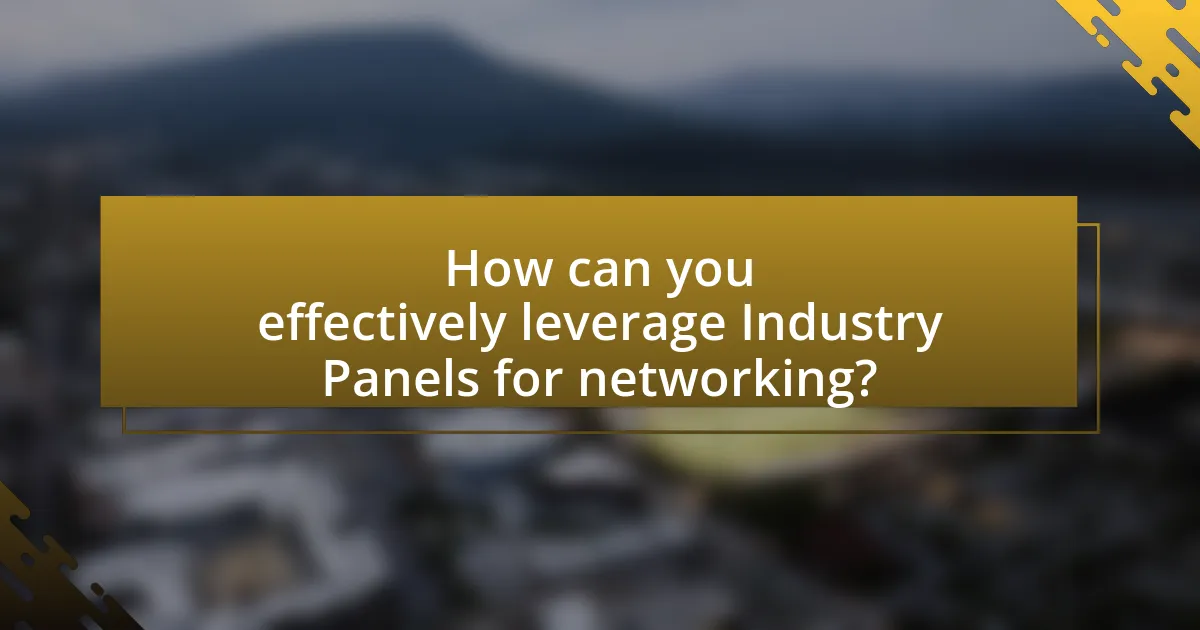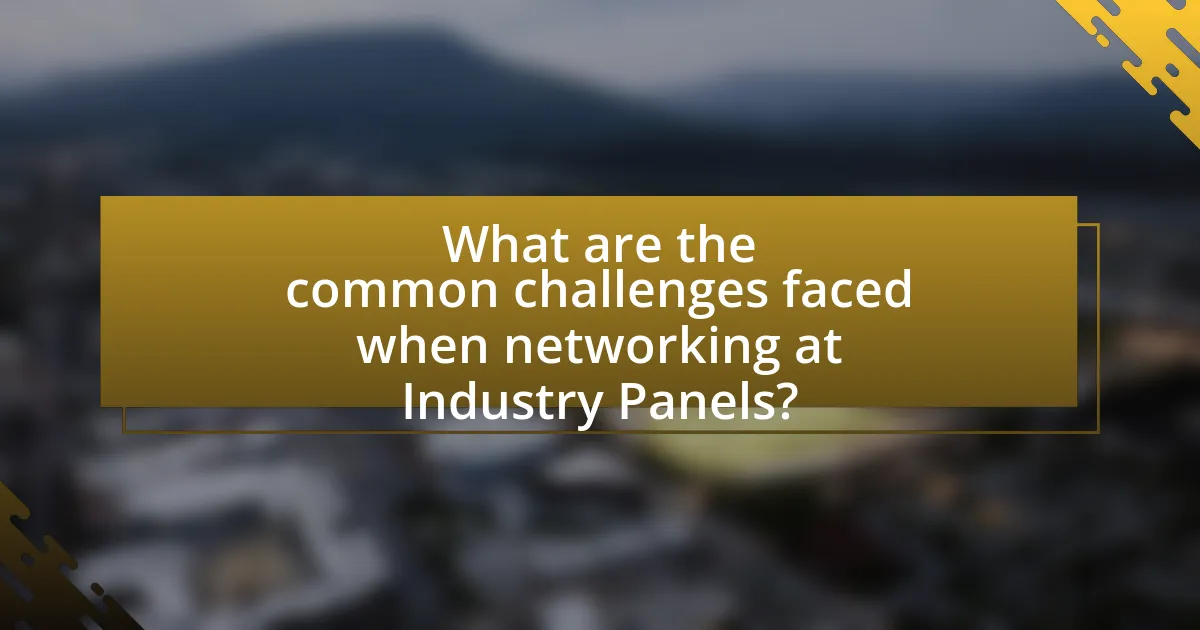Industry panels at TV media festivals are structured discussions featuring experts from the television and media industry who share insights on trends, challenges, and innovations. These panels facilitate networking opportunities by allowing attendees to engage with industry leaders through Q&A sessions and discussions. Key participants include producers, directors, and executives, while attendees can maximize their networking potential by preparing in advance, actively engaging during discussions, and following up after the event. The article outlines strategies for effective networking, common challenges faced, and best practices to create a memorable personal brand within the context of industry panels at TV media festivals.

What are Industry Panels at TV Media Festivals?
Industry panels at TV media festivals are structured discussions featuring experts from the television and media industry who share insights, trends, and experiences. These panels typically include a moderator and a group of panelists who engage in dialogue on specific topics relevant to the industry, such as content creation, distribution, and emerging technologies. The format allows for audience interaction, providing attendees with the opportunity to ask questions and gain valuable knowledge. Industry panels serve as a platform for networking, as they bring together professionals, creators, and enthusiasts, facilitating connections that can lead to collaborations and career advancements.
How do Industry Panels function within the context of TV Media Festivals?
Industry panels at TV media festivals serve as platforms for industry professionals to discuss trends, share insights, and engage in dialogue about the future of television. These panels typically feature experts from various sectors of the media industry, including producers, directors, and executives, who present their perspectives on relevant topics, fostering knowledge exchange. The interactive nature of these panels allows attendees to ask questions and participate in discussions, enhancing networking opportunities. For instance, events like the Banff World Media Festival and the MIPCOM market include industry panels that attract significant attendance, demonstrating their role in connecting professionals and facilitating collaboration within the television landscape.
What types of discussions typically occur in Industry Panels?
Industry panels typically engage in discussions about current trends, challenges, and innovations within a specific industry. These discussions often include expert insights on market dynamics, case studies of successful projects, and debates on regulatory impacts. For instance, at TV media festivals, panels may focus on the evolution of content distribution, the influence of streaming services, and the future of audience engagement strategies. Such discussions are supported by data from industry reports, showcasing shifts in viewer preferences and technological advancements that shape the media landscape.
Who are the key participants in these panels?
The key participants in these panels typically include industry experts, panel moderators, and audience members. Industry experts often consist of producers, directors, writers, and executives from television networks or production companies who share insights and experiences. Panel moderators facilitate discussions and guide the conversation, ensuring that key topics are addressed. Audience members, which may include aspiring professionals, students, and other stakeholders, engage with the panelists through questions and networking opportunities. This structure fosters a dynamic exchange of ideas and enhances networking potential at TV media festivals.
Why are Industry Panels important for networking?
Industry panels are important for networking because they provide a structured environment where professionals can engage with industry leaders and peers. These panels facilitate direct interactions, allowing attendees to ask questions, share insights, and build relationships that can lead to future collaborations. Research indicates that networking opportunities at industry events significantly enhance career prospects; for instance, a study by the Networking Institute found that 70% of jobs are obtained through networking. This underscores the value of industry panels as a catalyst for meaningful connections within the TV media landscape.
What networking opportunities do Industry Panels provide?
Industry panels provide valuable networking opportunities by facilitating direct interactions between industry professionals, experts, and attendees. These panels often include Q&A sessions, allowing participants to engage with speakers, ask questions, and share insights, which fosters connections. Additionally, the informal settings before and after panel discussions enable attendees to network with peers and industry leaders, enhancing relationship-building. Research indicates that 70% of professionals find networking at industry events crucial for career advancement, underscoring the importance of these opportunities in the context of TV media festivals.
How can attendees maximize their networking potential during these panels?
Attendees can maximize their networking potential during panels by actively engaging with speakers and fellow participants. Engaging includes asking insightful questions, participating in discussions, and following up with individuals after the panel. Research indicates that networking is most effective when individuals initiate conversations, as 70% of professionals report that personal interactions lead to valuable connections. Additionally, attendees should prepare by researching panelists and their work, which allows for more meaningful conversations and demonstrates genuine interest. This proactive approach not only enhances visibility but also increases the likelihood of forming lasting professional relationships.

How can you effectively leverage Industry Panels for networking?
To effectively leverage Industry Panels for networking, actively engage with panelists and attendees by asking insightful questions and participating in discussions. This approach fosters connections and demonstrates your interest in the industry. Research shows that networking during such events can lead to valuable relationships; for instance, a survey by LinkedIn found that 85% of jobs are filled through networking. By following up with contacts after the event, you can solidify these connections and explore potential collaborations or opportunities.
What strategies can enhance your networking experience at Industry Panels?
To enhance your networking experience at industry panels, actively engage with speakers and attendees by asking insightful questions and initiating conversations. This approach fosters connections and demonstrates your interest in the subject matter. Research indicates that networking effectiveness increases when individuals participate in discussions, as it allows for the exchange of ideas and personal experiences, which can lead to meaningful relationships. Additionally, following up with contacts after the event through personalized messages can solidify these connections, as studies show that timely follow-ups significantly improve the likelihood of establishing lasting professional relationships.
How should you prepare before attending an Industry Panel?
To prepare before attending an Industry Panel, research the panelists and their topics thoroughly. Understanding the backgrounds and expertise of the panelists allows for informed questions and meaningful engagement during the discussion. Additionally, reviewing the agenda and key themes of the panel helps in identifying specific areas of interest and potential networking opportunities. Engaging with relevant industry news and trends prior to the event equips attendees with context that can enhance conversations. This preparation is essential as it increases the likelihood of making valuable connections and gaining insights that are applicable to one’s professional development in the media industry.
What techniques can you use to engage with panelists and attendees?
To engage with panelists and attendees effectively, utilize techniques such as active listening, asking open-ended questions, and facilitating interactive discussions. Active listening demonstrates genuine interest, encouraging panelists and attendees to share insights. Open-ended questions stimulate deeper conversations, allowing for richer exchanges of ideas. Facilitating interactive discussions, such as Q&A sessions or live polls, fosters a collaborative environment, enhancing engagement. These techniques are supported by research indicating that interactive formats increase participant involvement and satisfaction, as seen in studies on audience engagement at conferences.
What follow-up actions are essential after attending an Industry Panel?
Essential follow-up actions after attending an Industry Panel include sending personalized thank-you emails to panelists and networking contacts, connecting on professional social media platforms, and reviewing notes taken during the panel for actionable insights. Sending thank-you emails reinforces relationships and shows appreciation, which can lead to future opportunities. Connecting on platforms like LinkedIn helps maintain professional ties and opens doors for further communication. Reviewing notes allows attendees to implement learned strategies and insights into their own work, enhancing the value gained from the panel experience.
How can you maintain connections made during the panel?
To maintain connections made during the panel, actively follow up with participants through personalized emails or messages within a week after the event. This approach reinforces the initial interaction and shows genuine interest in continuing the conversation. Research indicates that timely follow-ups significantly increase the likelihood of establishing lasting professional relationships, as noted in studies on networking effectiveness. Additionally, engaging with their content on social media platforms can further solidify these connections, as consistent interaction keeps you on their radar and fosters a sense of community.
What tools can assist in managing your networking contacts?
Tools that can assist in managing networking contacts include customer relationship management (CRM) software, contact management apps, and networking platforms. CRM software like Salesforce and HubSpot allows users to organize and track interactions with contacts, providing insights into relationship history and engagement. Contact management apps such as CamCard and Contacts+ enable users to store and categorize contact information efficiently, often integrating with other tools for seamless updates. Networking platforms like LinkedIn facilitate connections and follow-ups, offering features to manage professional relationships effectively. These tools enhance organization and communication, making it easier to maintain and grow professional networks.

What are the common challenges faced when networking at Industry Panels?
Common challenges faced when networking at industry panels include difficulty in initiating conversations, managing time effectively, and overcoming social anxiety. Initiating conversations can be challenging due to the competitive atmosphere and the presence of industry leaders, which may intimidate attendees. Effective time management is crucial, as panels often have limited networking opportunities, making it essential to prioritize interactions. Additionally, social anxiety can hinder individuals from approaching others, especially in large groups, impacting their ability to make meaningful connections. These challenges are frequently reported by attendees at industry events, highlighting the need for strategies to navigate networking effectively.
How can you overcome shyness or anxiety in networking situations?
To overcome shyness or anxiety in networking situations, individuals can prepare by practicing conversation starters and setting specific goals for interactions. Preparation reduces uncertainty, which is a significant contributor to anxiety. Research indicates that rehearsing social interactions can enhance confidence and decrease anxiety levels (Hofmann et al., 2012, Cognitive Therapy and Research). Additionally, focusing on the other person rather than oneself can shift attention away from anxiety, making conversations feel more natural. Engaging in small talk and gradually increasing the complexity of interactions can also help build comfort over time.
What are effective ways to initiate conversations with strangers?
Effective ways to initiate conversations with strangers include starting with a friendly greeting, asking open-ended questions, and making observations about the environment. For instance, a simple “Hi, how are you?” can break the ice, while questions like “What brought you to this event?” encourage dialogue. Observations, such as commenting on a speaker’s presentation, can also serve as conversation starters. Research indicates that open-ended questions foster deeper connections, as they require more than a yes or no answer, promoting engagement and interaction.
How can you handle rejection or unresponsive contacts?
To handle rejection or unresponsive contacts, maintain a professional demeanor and focus on resilience. When faced with rejection, acknowledge the situation, learn from the experience, and move forward without taking it personally. For unresponsive contacts, follow up politely after a reasonable period, as studies show that persistence can yield results; for instance, a 2019 HubSpot report indicated that 80% of sales require five follow-ups after the initial contact. If there is still no response, shift your focus to new opportunities and connections, as diversifying your network can enhance your chances of success in future engagements.
What are the best practices for successful networking at Industry Panels?
The best practices for successful networking at industry panels include preparing in advance, actively engaging during discussions, and following up after the event. Preparing in advance involves researching panelists and attendees to identify potential connections and formulating relevant questions or topics to discuss. Actively engaging during discussions means asking insightful questions and contributing to conversations, which can help establish rapport with industry leaders and peers. Following up after the event is crucial; sending personalized messages to individuals met at the panel reinforces connections and opens doors for future collaboration. These practices are supported by networking studies indicating that proactive engagement and follow-up significantly enhance relationship-building opportunities in professional settings.
How can you create a memorable personal brand during networking?
To create a memorable personal brand during networking, focus on clearly defining your unique value proposition and consistently communicating it. This involves identifying what sets you apart in your industry, such as specific skills, experiences, or perspectives, and articulating this in conversations. Research indicates that individuals who can succinctly express their personal brand are more likely to be remembered; for instance, a study by the Harvard Business Review found that personal branding significantly impacts professional opportunities and networking success. By actively engaging in discussions, sharing relevant insights, and following up with personalized messages, you reinforce your brand and enhance recall among your peers.
What etiquette should you follow when networking at these events?
When networking at industry panels during TV media festivals, you should prioritize respectful communication and active listening. Engaging with others by making eye contact, offering a firm handshake, and using polite language establishes a positive impression. Additionally, it is essential to be mindful of personal space and avoid interrupting others while they speak, as this demonstrates respect for their contributions.
Following up with new contacts after the event through a personalized message reinforces connections and shows appreciation for the conversation. According to a study by the Harvard Business Review, effective networking can lead to increased opportunities and collaborations, highlighting the importance of proper etiquette in these settings.
What practical tips can enhance your networking experience at TV Media Festivals?
To enhance your networking experience at TV Media Festivals, actively participate in industry panels by asking insightful questions and engaging with speakers. This approach not only demonstrates your interest but also increases your visibility among industry professionals. Research shows that attendees who engage in discussions during panels are more likely to form meaningful connections, as they create opportunities for follow-up conversations. Additionally, prepare a concise personal pitch to introduce yourself effectively, which can facilitate deeper interactions with potential contacts.

Leave a Reply